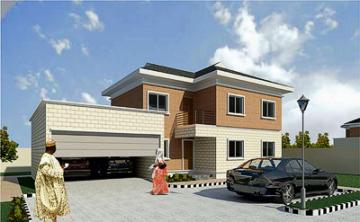Nigerian Property Market impacted by Anti-Graft laws
 Nigerian Independent Corrupt Practices and Other Related Offences Commission has reportedly confiscated some buildings said to have been owned by public servants whose earnings do not support ownership of such grand structures.
Nigerian Independent Corrupt Practices and Other Related Offences Commission has reportedly confiscated some buildings said to have been owned by public servants whose earnings do not support ownership of such grand structures.
With the introduction of President Muhammadu Buhari’s administration, there has been a massive offload of properties, especially in the high-end market, having an impact on Nigeria's property market due to government’s anti-graft laws.
According to Nigerian reports, the Independent Corrupt Practices and Other Related Offences Commission has reportedly confiscated some buildings said to have been owned by public servants whose earnings do not support ownership of such grand structures.
In response, public servants with such properties have been selling them to avoid losing this real estate to President Muhammadu Buhari’s anti-graft crusade and gain a profit.
Damola Akindolire, General manager of Alphamaed Property Development said, what has been seen in the property space is higher vacancy ratios which have gone up about 10 per cent.
In the attempt to not completely lose out due to the anti-graft laws, many public servants are selling.
Akindolire said it definitely will lead to some decline in the high-end property market because many of these public servants will now be hesitant to buy. However, this does not mean that the selling of this property equates to it selling off like hot bread.
According to Akindolire, the property is quite "over-priced" and will unlikely lead to investment greed.
Developers built most of these properties when the market was in an off swing, he adds. “What we have right now is a bias market… also the devaluation of currencies [China] will also affect how much they can take in the current market.”
Akindolire further noted that the liquidity of the Nigerian market is not currently at a place where it can take advantage of this current state.
He cited the Nigerian Bureau of Statistics Report that said Nigeria’s foreign direct investment had declined by 46 per cent.
Commenting on the rental market in Nigeria Akindolire said it is part of the larger socioeconomic market in Nigeria and it’s impacted by high home ownership and low liquidity.
“We will continue to see pressure on suburbs that are within 35 minutes from the major CBDs and this pressure will continue until the infrastructure deficit on [property development] goes down, “ Akindolire said.
Most Popular
Breaking 'ground' on first Hilton Hotel in Cape Verde
Luxurious beach front hotels developer, the Resort Group is developing first Hilton Hotel in Cape Verde’s capital and largest city, Praia. ... Full story










